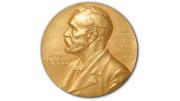Last Monday, a Harvard faculty member and an alumnus shared the 2019 Nobel Prize in physiology or medicine with a third scholar. Today, another Harvard faculty member and another alumnus did the same: Gates professor of developing societies Michael Kremer ’85, Ph.D. ’92, and Abhijit Banerjee, Ph.D. ’88, Ford Foundation international professor of economics at MIT, won the 2019 Sveriges Riksbank Prize in Economic Sciences in Memory of Alfred Nobel with Esther Duflo, Abdul Latif Jameel professor of poverty alleviation and development economics at MIT. (Banerjee and Duflo are now the fifth married couple to have shared the prize in the same field.) The trio were honored “for their experimental approach to alleviating global poverty.”
Read earlier Harvard Magazine coverage of Professor Kremer’s research here; in a turn-of-the-millennium roundtable on the world’s poor; on dictatorship here; on the policy innovations that contributed to the Nobel, here; and on coverage of Kremer’s fellow laureates and their work together.









